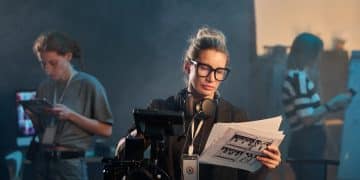Casting Controversy: Fan Reactions to New Drama Lead Role

Casting controversy arises as fans express mixed reactions to the lead role announcement in an upcoming drama, sparking debates and discussions across social media platforms.
The announcement of the lead role in the new drama series has ignited a casting controversy: fans react to lead role announcement in upcoming drama with a mix of excitement and disappointment. Is the chosen actor the right fit?
The Initial Announcement: A Spark of Hope or a Sign of Trouble?
The initial casting announcement often sets the tone for a drama series. It’s the first glimpse fans get of how the production team envisions bringing their beloved characters to life. But what happens when that vision doesn’t align with audience expectations?
When the lead role in the highly anticipated drama was revealed, the response was far from uniform. While some fans celebrated the choice, praising the actor’s talent and potential to embody the character, others expressed concerns, questioning the actor’s suitability for the role. This divergence of opinion quickly escalated into a full-blown casting controversy, playing out across social media platforms and online forums.
![Close-up shot of a smartphone screen displaying a trending topic on Twitter related to the casting announcement. The hashtags include #CastingControversy, #[DramaTitle], and #[ActorName]. The comments visible range from supportive to critical, creating a visual representation of the online debate.](https://endingnew.com/wp-content/uploads/2025/07/endingnew.com_10_1751895354_072c821d_internal_1.jpg)
Key Factors Fueling Casting Controversies
Several factors contribute to the eruption of casting controversies. Understanding these elements can shed light on why fans react so passionately to these announcements and why certain casting choices become lightning rods for debate.
Source Material Accuracy
One of the most significant factors is the perceived accuracy of the casting in relation to the source material. Whether the drama is based on a novel, comic book, or historical event, fans often have a strong mental image of the characters. Any deviation from these expectations can trigger criticism.
Previous Roles and Public Image
An actor’s previous roles and public image also play a crucial role. If an actor is primarily known for playing vastly different characters, fans might struggle to envision them in the new role. Similarly, any controversies or negative publicity surrounding the actor can influence public perception.
- Actor’s Physical Appearance: An actor’s physical characteristics, such as age, height, or build, can be scrutinized if they don’t align with the established description of the character.
- Acting Style: Fans may question whether an actor’s acting style is appropriate for the nuances and complexities of the role.
- Cultural Sensitivity: In some cases, casting choices can raise questions about cultural sensitivity, particularly if an actor is cast in a role that doesn’t align with their own ethnicity or background.
Ultimately, the confluence of these factors can create a perfect storm of controversy, leading to intense scrutiny and heated debates within the fan community.
Understanding what drives these discussions is paramount in grasping the dynamics of audience reception to casting decisions.
Social Media as a Battleground: Where Opinions Clash
Social media platforms have become the primary battlegrounds for voicing opinions, both positive and negative, regarding casting choices. The immediacy and accessibility of these platforms allow fans to express their views directly to the production team and the actors themselves, creating a highly charged environment.
Twitter, Facebook, Instagram, and online forums are filled with comments, memes, and petitions, all centered around the casting decision. Hashtags like #CastingFail or #JusticeFor[CharacterName] often trend, amplifying the voices of discontented fans. The anonymity afforded by some platforms can embolden users to make harsh criticisms, further fueling the casting controversy.
Positive vs. Negative Reactions: A Polarized Landscape
The reactions on social media are rarely uniform. While some fans passionately defend the casting choice, highlighting the actor’s talent and potential, others vehemently oppose it, citing concerns about accuracy, suitability, or previous roles.
This polarization can create echo chambers, where individuals are primarily exposed to opinions that align with their own, further reinforcing their beliefs. The resulting online environment can be toxic, with personal attacks and inflammatory rhetoric overshadowing constructive discussions.
- Online Petitions: Platforms like Change.org often host petitions demanding that the production team reconsider the casting choice, demonstrating the level of engagement and concern among fans.
- Fan Art and Edits: Supporters of the casting choice may create fan art and edits showcasing the actor in the role, attempting to visualize the character and sway public opinion.
- Constructive Dialogue: Amidst the chaos, some fans attempt to foster constructive dialogue, offering reasoned arguments and perspectives on the casting decision.
Consequently, social media represents a complex landscape where opinions collide. Balancing constructive conversation and heated debate is difficult, influencing the overall climate surrounding the production.
Understanding this dynamic is critical for both the production team and the fans navigating the casting controversy.

Historical Casting Controversies: Lessons from the Past
Casting controversies are not a new phenomenon. History is replete with examples of casting choices that sparked outrage and debate. Examining these past instances can provide valuable insights into the dynamics of fan reactions and the potential consequences for the production.
One notable example is the casting of Michael Keaton as Batman in Tim Burton’s 1989 film. Many fans initially questioned the choice, arguing that Keaton, primarily known for comedic roles, lacked the gravitas and imposing presence associated with the Dark Knight. However, Keaton’s performance ultimately won over many skeptics, demonstrating that initial impressions can be misleading.
Notable Examples and Their Outcomes
These historical examples serve as cautionary tales, highlighting the importance of careful consideration and effective communication when making casting decisions. They also underscore the power of a strong performance to overcome initial skepticism and win over even the most critical fans.
Sometimes, controversies stem from differences of opinion regarding appearance, experience, or reputation, affecting the overall sentiment toward the casting choice.
- Heath Ledger as The Joker: Similar to Keaton, Ledger faced criticism for his casting as the Joker. His tragic death and subsequent performance proved his detractors wrong, earning him posthumous acclaim.
- Daniel Craig as James Bond: Craig’s casting was met with resistance due to his blonde hair and perceived lack of sophistication. He went on to become one of the most popular Bond actors.
- Ben Affleck as Batman: Affleck’s casting was widely ridiculed, drawing heavy criticism. His portrayal divided fans.
Consequently, learning from these events could assist future productions in navigating audience expectations.
Understanding these scenarios can enhance the resilience and credibility of the casting process.
How Production Teams Respond to Fan Backlash
When a casting controversy erupts, production teams face a delicate balancing act. They must acknowledge fan concerns while maintaining their creative vision. The way they respond can significantly impact public perception of the drama series.
One approach is to address the concerns directly, explaining the reasoning behind the casting choice and highlighting the actor’s strengths. This can involve releasing statements from the director, producers, or the actor themselves. Some production teams may even engage with fans on social media, attempting to address their concerns in a more personal and interactive manner. However, this approach can be risky, as it can also amplify the controversy and invite further criticism.
Strategies for Managing Public Perception
Often, they try to reassure fans, while standing firm behind their choices.
Another strategy is to focus on showcasing the actor’s talent through trailers, promotional materials, and behind-the-scenes footage. By giving fans a glimpse of the actor in character, the production team can attempt to demonstrate their suitability for the role and alleviate concerns. However, this approach requires careful execution, as any misstep can further fuel the controversy.
- Public Statements: Production teams will issue controlled and structured statements to appease concern without compromising their vision.
- Highlighting Actor’s Merits: It is common to emphasize the actor’s qualifications, skills, and passion for the role through various media channels.
- Engaging with Fans: Select teams may opt to address specific queries and engage with the audience in controlled environments to clarify intentions and foster understanding.
Ultimately, the most effective strategy is one that combines transparency, communication, and a commitment to delivering a compelling and authentic portrayal of the character. Only time and the release of the drama series can truly determine whether the casting choice was successful.
Finding the right response is crucial to maintaining faith and excitement in the project.
The Actor’s Perspective: Navigating the Storm
For the actor at the center of a casting controversy, the experience can be incredibly challenging. They are often subjected to intense scrutiny and criticism, even before they have had a chance to demonstrate their abilities in the role. Navigating this storm requires resilience, professionalism, and a strong support system.
Some actors choose to ignore the controversy altogether, focusing on their performance and allowing their work to speak for itself. Others may engage with fans, attempting to address their concerns and demonstrate their commitment to the role. However, this approach can be risky, as it can also invite further scrutiny and criticism.
Coping Mechanisms and Strategies
Actors deal with controversy in various ways. It is crucial for them to stay grounded in the face of the storm.
One effective strategy is to focus on the positive aspects of the role, immersing themselves in the character and working closely with the director and other cast members. By channeling their energy into their performance, they can silence the critics and win over the fans.
- Focusing on the Work: Actors might prioritize their understanding of the assigned character to showcase their capabilities amidst controversy.
- Seeking Support: Leaning onto a reliable support network is crucial for emotional wellbeing and professional guidance.
- Maintaining Professionalism: Actors are advised to remain focused, dedicated, and demonstrate their capabilities without engaging in the negativity.
Ultimately, the actor’s ability to navigate the storm depends on their resilience, talent, and the support they receive from the production team and their personal network.
Balancing external pressures with internal enthusiasm is essential to survive and thrive during times of casting uncertainty.
The Final Verdict: Can a Performance Overcome Controversy?
The ultimate question is whether a strong performance can overcome the initial controversy surrounding a casting choice. History suggests that it is indeed possible. Many actors who initially faced skepticism have gone on to deliver memorable and acclaimed performances, proving their doubters wrong.
However, it’s important to acknowledge that a performance alone cannot always erase the controversy. Sometimes, the initial concerns are too deeply ingrained in the fan base, or the actor simply doesn’t live up to expectations. In these cases, the controversy can linger, overshadowing the actor’s performance and impacting the overall reception of the drama series.
Factors Influencing Audience Perception
Several elements combine to form the public’s opinion on controversy and casting.
Ultimately, the success of a casting choice depends on a complex interplay of factors, including the actor’s talent, the quality of the script, the direction, and the overall execution of the drama series. While initial impressions can be powerful, they are not always the deciding factor. A truly exceptional performance has the power to transcend controversy and leave a lasting impression on audiences.
- Quality of Performance: A stellar performance can shift attitudes and perceptions around the casting.
- Loyalty to Source Material: Productions that remain faithful to the original source are more likely to gain acceptance.
- Original Expectations: Perceptions evolve in conjunction to how the role and the story materialize, thus influencing opinions.
Thus, the final judgment is only known after the release and overall feedback from the viewed product.
Overall success hinges on quality output, which leads to acceptance and acclaim.
| Key Element | Brief Description |
|---|---|
| 📢 Announcement Impact | Initial reactions can significantly shape the drama series’ perception. |
| 🎭 Actor’s Role | The actor’s performance is crucial in overcoming controversy. |
| 🌐 Social Media | Social Platforms become battlegrounds for voicing opinions, making responses important |
| 🎬 Production Response | How productions manage backlash affects viewer reception of the series. |
FAQ Section
▼
A casting choice becomes controversial when fans question the actor’s suitability for the role based on factors like appearance, previous roles, or source material accuracy.
▼
Fan reactions can range from disappointment and skepticism to outrage, often expressed through social media campaigns, petitions, and online discussions.
▼
Yes, a compelling and authentic performance can often win over skeptical fans and overshadow the initial controversy surrounding the casting choice.
▼
Actors might ignore the controversy and concentrate on delivering an outstanding performance, or they might engage with fans to reassure and demonstrate their passion for the role.
▼
Social media serves as a primary platform for fans to express opinions, both positive and negative, thereby amplifying the casting controversy and potentially influencing public perception.
Conclusion
Ultimately, the narrative surrounding a casting controvery: fans react to lead role announcement in upcoming drama reflects a complex interaction of public sentiment and creative expression. While initial skepticism is a common reaction, the ability of an actor to embody a role convincingly and the production’s commitment to honoring the source material can often transform those doubts into acclaim. The impact of social media further complicates audience perception, but the essence of a successful casting resides in stellar performance and directorial fidelity. Understanding these dynamics provides a clearer lens through which to view the evolving landscape of media casting and fan engagement.





